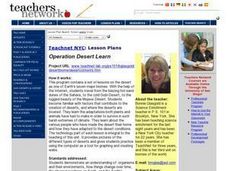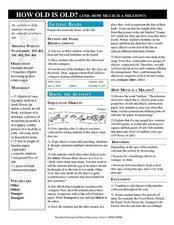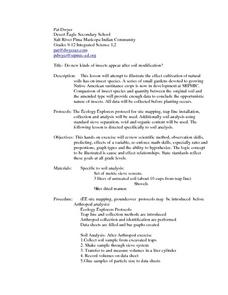Curated OER
Operation Desert Learn
Students familiarize themselves with factors that contribute to the creation of deserts and where deserts are located. They research the adaptations that both plants and animals need to make in the harsh conditions. They explore the...
Curated OER
Cactus Wheel
Students explore plant biology by conducting field experiments outside of class. In this desert plant lesson, students discuss how cacti thrive in such dry climates and how dense their populations are. Students utilize action cards, a...
National Wildlife Federation
Get Your Techno On
Desert regions are hotter for multiple reasons; the lack of vegetation causes the sun's heat to go straight into the surface and the lack of moisture means none of the heat is being transferred into evaporation. This concept, and other...
Desert Discoveries
How Old is Old? (And, How Much is a Million?)
Here is an interesting lesson on how old things are designed for young scientists. In it, learners compile a list of their birthdays, and the class puts them in sequential order from youngest to oldest. Then, they sequence 15 objects...
Curated OER
Plant Diversity and Distribution
Students construct a defined plot on school grounds and observed patterns in plant life. They count trees, shrubs, cacti and record on a data sheet. They compare data and generate a plant diversity overlook for their school.
Alabama Learning Exchange
Scrapping the Biomes
Fifth graders investigate biomes of the earth. In this biomes lesson, 5th graders explore eight different biomes which include the tropical rain forest, deciduous forest, grasslands, and taiga. They design an artistic scrapbook that...
Curated OER
Allele and Phenotype Frequencies in Rock Pocket Mouse Populations
In the deserts of Arizona and New Mexico, some tiny creatures show just how quickly natural selection can turn a mutation into an advantageous adaptation. Watch a video about rock pocket mice, who show that one small change can make all...
Curated OER
Do new kinds of insects appear after soil modification?
Students explore and experiment with the concept do new kinds of insects appear after soil modification. They assess and review scientific methods of observation, predicting, variables, math skills, ratio, proportions, graphs and the art...
Curated OER
Animal Habitat Bar Graph
In this graphing instructional activity, students examine a prepared bar graph and record which habitat their chosen animal lives in: desert, city, forest, ocean, prairie, or fresh water. There are no directions but it appears that a...
Curated OER
Desert Animals
Students are asked if they think a roadrunner is a bird that is a fast runner or a slow runner? They are given a copy of Roadrunner Display Sheet. Students are asked how does a roadrunner protect iteself? They are given the following...
Curated OER
The Prairie Climate
Ninth graders research the average temperature and precipitation of a prairie region to determine the type of climate it is, and how it differs from other biomes. They examine the types of adaptions animals have made to live in the...
Curated OER
Wildlife
The centerpiece of this lesson plan is a predator-prey simulation in which colored paperclips represent different species of animals camouflaged against a colored background. Relevant follow-up questions are provided. The activity is...
Curated OER
Hunt the Fact Monster (November #2)
In this Fact Monster search engine worksheet, students access the Internet to a specific website to find the answers to five questions with multiple choice answers.
Curated OER
Wildlife Burrows
Burrowing animals are busy! Get your middle school ecologists busy as well by having them create a scale model of a burrowing population. They also design a PowerPoint or poster to explain their models.
Curated OER
What Is El Niño?
Students access information at remote sites using telecommunications, identify impacts by reviewing past El Ni??o events, make and use scale drawings, maps, and maps symbols to find locations and describe relationships.
Curated OER
Biome Detective Sheet
In this biomes worksheet, students research the plant and animal life found in different habitats. This worksheet has 38 short answer questions.
Baylor College
We Need Water
There's nothing quite like a glass of ice-cold, freshly squeezed lemonade. Lesson seven of this series explains how the water humans need to survive can come in many forms. Teach your class about how much water humans require every day...
Curated OER
Migration Mania
Learners explore the migratory patterns of four different animals. Reasons for the migration and migratory distances are investigated in this instructional activity.
Curated OER
How much is Dirt Worth?
Students problem solve to understand the value of the Earth's soil. In this value of dirt lesson, students understand how much of Earth is made of dirt and how important to our survival it is.
Curated OER
Hold on Tight!
Students explore the relationship between plant roots and the soil in which they grow. They examine photos of uprooted trees and desert areas and
conduct experiments designed to highlight this mutual relationship between roots and soil....
Curated OER
ESL General Knowledge Quiz 1- Fill in the Table
In this ESL general knowledge quiz worksheet, students answer 20 questions. They answer questions about bird, capital cities, money, countries, oceans, math, and geography. They are able to score 20 points by getting each answer correct.
Curated OER
Tropical Atlantic Aerosols
Students analyze NASA data from the Multi-angle Imaging Spectroradiometer. In this NASA data lesson, students access an assigned website to examine information from the MISR on the Terra Satellite. They determine how desert dust travels...
Curated OER
Temperature
In this temperature worksheet, students color a thermometer to depict the given temperature. They then compare, contrast temperatures and answer given thinking questions. There are approximately 20 questions on this one-page worksheet....
Curated OER
The Coyote Population: Kansas Prairies
Students discover animal lifestyles by researching their ecosystem. In this animal statistics lesson, students research the geography of Kansas and discuss the reasons why wild animals survive in the open Kansas fields. Students complete...























